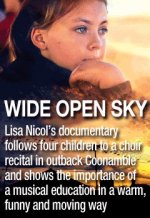
WIDE OPEN SKY
Australia, 2015, 87 minutes, Colour.
Michelle Leonard.
Directed by Lisa Nicol.
Most audiences should enjoy Wide Open Sky very very much, even if they are not so strongly into music, song and choirs. The personalities of those involved and of the children will certainly win them over.
This is a story about singing, about children singing, about a choir in north-western New South Wales. The energy behind the program is from a singing teacher and conductor, Michelle Leonard, who hailed from Coonamble and now has returned to these country towns with her project, the Moorambilla Voices. She is an engaging personality, a touch larger than life, able to communicate with the children particularly well.
Every autumn she goes round to the towns, visits schools, especially the primary schools, asking the children to sing, listening attentively to their voices, their pitch and their accuracy in notes. She chooses over 150 and they all go to a camp in the town of Baradine for three days, bonding, rehearsing, getting ready for a concert which takes place in Coonamble. While a lot of the film is taken up with the rehearsals, the boys’ part of the choir, the girls’ part of the choir, learning the songs, the words and the music, there are also scenes of children at play, the different kinds of bonding between the girls and the boys amongst themselves.
Six children have been singled out for particular attention in the film. It is the two boys who make the most impression. For one, Mack, it is a kind of Billy Elliot story, not interested in football so much but wanting to sing and certainly a talent for dance and movement. He is confident in speaking to camera, in singing solos, and is supported by his parents who did try to get him interested in football but now foster his music ability. The other boy is a little boy, with some aboriginal background, who loves playing football, is short in stature, a touch of the cheeky, and certainly anxious to succeed in singing. One of the girls is certainly more assertive, wanting to be an actress, good at singing, but at times self-conscious, something she calls “shame”. There are three other girls, one talented singer was interested in medicine, and two girls who are interviewed together and bounce energetically off each other.
We also see the associate staff, the young choir assistant as a composer, a driver, the camp manager, youth workers, especially young man who has come up through the ranks and come out of himself, and the cooks and kitchen staff.
Children appreciate affirmation, recognition of their abilities, of who they are, the development of talents that they may not have realised – and this is what Michelle Leonard does with these children, over 20oo in ten years, and watching her and the children leads to the words like inspiring, encouraging, – and even exhilarating.
1. Acclaim for the film? The popularity with audiences?
2. The title, the countryside, the song?
3. Audience interest in music, song, choirs, children?
4. A film of affirmation, justice for young children, who are poor, those in need, possibilities for the future, talent, transformation, the children and their parents, the children and their peers, performance, achievement?
5. The location photography, the open road and countryside, the towns of north-western New South Wales, homes, main streets, shops, pubs, the schools, football fields?
6. The focus on Michelle Leonard, her background in Coonamble, help when she was a girl, her love of music, leaving the town, the training, the idea of the choir, and the ten years of success, the range of staff she employed, love for music, the composers, the managers, the youth workers, cooks?
7. Her personality, seen at the auditions, hearing the pitvh of the voices, the choice of the children, her ability in communication and putting the children at ease, at the camp, the choir sessions, the songs, the training and her schools, with each of the children, affirmation and sensitivity?
8. The range of children, the number, from all kinds of backgrounds, aboriginal backgrounds? The children, Mack, his parents, the Billy Elliot story and his dancing shoes at the theatre performance, not into football, his dancing, his schoolfriends, his singing? The scenes of his dancing – like an audition? The small boy, aboriginal background, dance, the football, talking, his friends? Going to Knox Grammar and the scholarship, the suit? The young girl, on her bike, wanting to be an actress, singing, her talking about shame, her enjoyment of the camp? The girl who was able to sing, her family, in the bush, interest in being a vet, medicine? The two girls, friends, easy-going, bouncing off each other?
9. The portrait of the assistants, the driver, the choir assistant, composer, the manager, the kitchen staff, the young man and his development through the choir and his being employed ,interactions with the boys and girls?
10. The rehearsals, the enjoyment of the camp, the bonding? The return for the concert, the uniforms, walking in, the audience, the performance, the Sydney Orchestra, the drums, a gala occasion?
11. The glimpses of the children, the Australian background, from the Australian country, opportunities, parent support? Future?